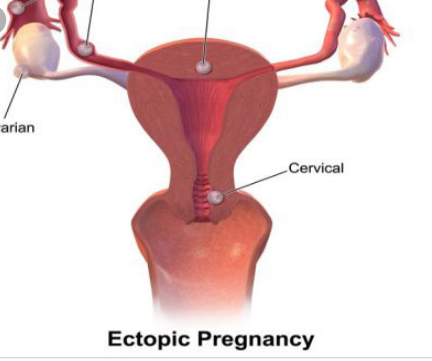What Is Ectopic Pregnancy?
Ectopic pregnancy, also called extrauterine pregnancy, is when a fertilized egg grows outside a woman’s uterus, somewhere else in her belly. It can cause life-threatening bleeding and needs medical care right away.
In more than 90% of cases, the egg implants in a fallopian tube. This is called a tubal pregnancy.
Ectopic Pregnancy Signs and Symptoms
Most of the time, an ectopic pregnancy happens within the first few weeks of pregnancy. You might not even know that you’re pregnant and may not notice any problems.
Early signs of an ectopic pregnancy include:
Light vaginal bleeding and pelvic pain
Upset stomach and vomiting
Sharp abdominal cramps
Pain on one side of your body
Dizziness or weakness
Pain in your shoulder, neck, or rectum
An ectopic pregnancy can cause your fallopian tube to burst or rupture. Emergency symptoms include major pain, with or without severe bleeding. Call your doctor right away if you have heavy vaginal bleeding with lightheadedness, fainting, or shoulder pain, or if you have severe belly pain, especially on one side.
Ectopic Pregnancy Causes and Risk Factors
You may never know why you have an ectopic pregnancy. One cause could be a damaged fallopian tube. It could keep the fertilized egg from getting into your uterus.
You’re more likely to have an ectopic pregnancy if you:
Have pelvic inflammatory disease (PID)
Smoke cigarettes
Are older than 35
Have a sexually transmitted infection
Have scarring from pelvic surgery
Had a previous ectopic pregnancy
Tried to have tubal ligation (tubes tied) or tubal ligation reversal
Use fertility drugs
Had fertility treatments such as in vitro fertilization (IVF)
It could also happen if you become pregnant while you have an intrauterine device (IUD) for birth control.
Ectopic Pregnancy Diagnosis
Your doctor will probably do tests that include a pregnancy test and a pelvic exam. They might give you an ultrasound to look at your uterus and fallopian tubes.
Ectopic Pregnancy Treatment
Because a fertilized egg can’t survive outside a uterus, your doctor will need to take it out so you don’t have serious health problems. They’ll use one of two methods: medication or surgery.
Medication. If your fallopian tube hasn’t ruptured and your pregnancy isn’t far along, your doctor can give you a shot of methotrexate (Trexall). It stops the cells from growing. Your body will absorb them.
Surgery. In other cases, you’ll need surgery. The most common is laparoscopy. Your doctor will make very small cuts in your lower belly and insert a thin, flexible tube called a laparoscope to remove the ectopic pregnancy. If your fallopian tube is damaged, they may have to remove it as well. If you’re bleeding a lot or your doctor suspects that your fallopian tube is ruptured, you might need emergency surgery with a larger cut. This is called laparotomy.
After an Ectopic Pregnancy
It might be hard for you to have a typical pregnancy afterward. Consider talking to a fertility specialist, especially if you had a fallopian tube removed.
And talk to your doctor about how long to wait before trying again. Some experts suggest giving yourself at least 3 months so your body has time to heal.
If you get pregnant again, since one ectopic pregnancy raises your risk of having another one, be mindful of changes in your body until your doctor can confirm that it’s growing where it should.
Source: Web MD


